-
 Bitcoin
Bitcoin $84,275.9738
-1.18% -
 Ethereum
Ethereum $1,573.8784
-1.51% -
 Tether USDt
Tether USDt $1.0000
0.01% -
 XRP
XRP $2.0508
-1.47% -
 BNB
BNB $590.3165
0.36% -
 Solana
Solana $136.8073
-1.57% -
 USDC
USDC $1.0000
0.02% -
 TRON
TRON $0.2456
0.95% -
 Dogecoin
Dogecoin $0.1541
-2.45% -
 Cardano
Cardano $0.6147
-1.97% -
 UNUS SED LEO
UNUS SED LEO $9.3554
-0.04% -
 Chainlink
Chainlink $12.9524
1.69% -
 Avalanche
Avalanche $19.3399
-1.65% -
 Toncoin
Toncoin $2.9731
0.19% -
 Stellar
Stellar $0.2417
-1.92% -
 Shiba Inu
Shiba Inu $0.0...01220
0.27% -
 Sui
Sui $2.0970
-2.03% -
 Hedera
Hedera $0.1613
-2.12% -
 Bitcoin Cash
Bitcoin Cash $334.7255
-0.82% -
 Polkadot
Polkadot $3.8075
1.75% -
 Hyperliquid
Hyperliquid $17.7039
-1.30% -
 Litecoin
Litecoin $75.8145
-0.21% -
 Dai
Dai $0.9999
-0.01% -
 Bitget Token
Bitget Token $4.4095
-1.49% -
 Ethena USDe
Ethena USDe $0.9992
0.00% -
 Pi
Pi $0.6261
-3.11% -
 Monero
Monero $214.8222
0.77% -
 Uniswap
Uniswap $5.1777
-0.97% -
 Pepe
Pepe $0.0...07374
2.27% -
 Aptos
Aptos $4.9197
2.06%
Can NFT solve copyright and intellectual property issues in the Metaverse?
While NFTs offer verifiable proof of digital asset ownership in the Metaverse, they don't automatically solve copyright issues; legal frameworks and enforcement remain crucial for complete IP protection.
Mar 07, 2025 at 03:12 am
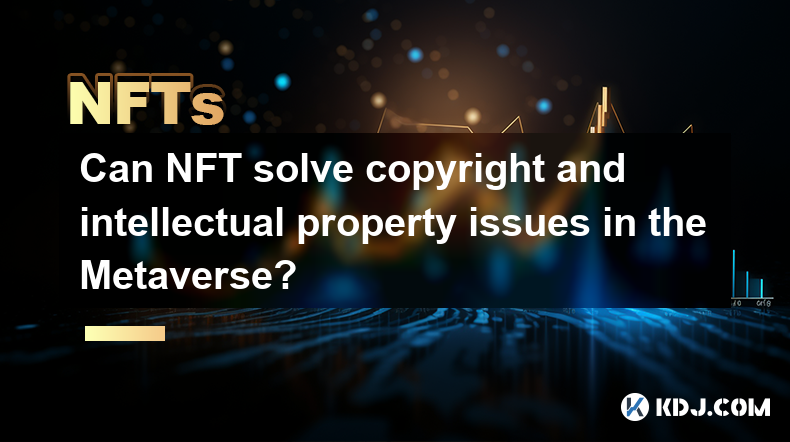
Key Points:
- NFTs offer a potential solution to copyright and intellectual property (IP) issues in the Metaverse by providing verifiable proof of ownership.
- However, NFTs themselves don't automatically solve all IP problems; legal frameworks and enforcement mechanisms still play a crucial role.
- The immutability of the blockchain offers a level of security against unauthorized copying and distribution, but doesn't eliminate all risks.
- The legal landscape surrounding NFTs and IP is still evolving, and ambiguities remain.
- The effectiveness of NFTs in protecting IP depends on factors such as proper metadata, clear licensing terms, and robust enforcement.
Can NFT solve copyright and intellectual property issues in the Metaverse?
The Metaverse, a persistent, shared, 3D virtual world, presents unique challenges to copyright and intellectual property (IP) protection. Digital assets, easily replicated and distributed, are vulnerable to infringement. Non-Fungible Tokens (NFTs), unique cryptographic tokens representing ownership of digital assets, are proposed as a solution. Do they succeed? The answer is complex.
NFTs offer a verifiable record of ownership on a blockchain. This immutability theoretically prevents fraudulent claims of ownership. If an NFT represents a digital artwork or in-world asset, the blockchain records its creation and subsequent transfers, providing a clear chain of custody. This enhances transparency and traceability, making it easier to identify the rightful owner.
However, the NFT itself doesn't automatically grant legal copyright or IP protection. Copyright and IP rights are determined by existing legal frameworks, not by the technology used to represent the asset. Simply minting an NFT for a digital work doesn't automatically transfer copyright to the NFT holder. The original creator retains copyright unless explicitly transferred.
While an NFT can prove ownership of a specific instance of a digital asset, it doesn't prevent unauthorized copying or reproduction. Someone could still illegally copy and distribute a digital artwork, even if the original owner holds the NFT. The NFT only proves ownership of the specific token, not the underlying intellectual property rights.
The legal implications are still unclear in many jurisdictions. Courts are yet to establish clear precedents regarding the legal weight of NFTs in IP disputes. The interpretation of NFT ownership and its relation to traditional copyright law is still developing. This legal uncertainty makes it risky to rely solely on NFTs for complete IP protection.
The metadata associated with the NFT plays a crucial role. Clear and comprehensive metadata detailing the copyright holder, licensing terms, and permitted uses are essential. Without such details, the NFT's value in protecting IP is significantly diminished. Ambiguous or incomplete metadata can lead to confusion and disputes.
Enforcement remains a challenge. While an NFT provides evidence of ownership, enforcing that ownership requires legal action. Tracking down infringers and pursuing legal remedies can be expensive and time-consuming, regardless of the presence of an NFT. The decentralized nature of the blockchain doesn't automatically provide a mechanism for IP enforcement.
Successfully using NFTs for IP protection in the Metaverse requires a multi-pronged approach. This includes carefully drafting licensing agreements, incorporating robust metadata into the NFT, and being prepared to pursue legal action if necessary. It’s not a simple "set it and forget it" solution.
NFTs can help prove ownership and deter infringement, but they are not a panacea. Existing legal frameworks remain crucial. The technology provides a valuable tool, but the full extent of its effectiveness in resolving IP disputes within the Metaverse is yet to be fully determined by legal precedents and further development of relevant laws.
Frequently Asked Questions:
Q: Does minting an NFT automatically grant copyright protection?
A: No. Minting an NFT proves ownership of the specific token, but doesn't automatically grant copyright protection. Copyright is determined by existing legal frameworks and must be explicitly transferred if the creator wishes to relinquish it.
Q: Can someone copy an asset even if it's represented by an NFT?
A: Yes. An NFT proves ownership of a specific token, but it doesn't prevent others from copying the underlying digital asset. The NFT only protects the ownership of the specific token on the blockchain, not the copyright to the digital asset itself.
Q: What role does metadata play in NFT-based IP protection?
A: Metadata is crucial. Clear and comprehensive metadata detailing copyright, licensing terms, and permitted uses strengthens the NFT's role in IP protection. Ambiguous metadata weakens its effectiveness.
Q: How can NFT ownership be enforced?
A: NFT ownership is enforced through legal channels. The NFT serves as evidence of ownership, but legal action is still necessary to address infringement. The decentralized nature of the blockchain doesn't automatically provide enforcement mechanisms.
Q: Are NFTs a complete solution for IP issues in the Metaverse?
A: No. NFTs offer a valuable tool for demonstrating ownership and deterring infringement, but they are not a complete solution. Existing legal frameworks and enforcement mechanisms are still crucial for robust IP protection.
Disclaimer:info@kdj.com
The information provided is not trading advice. kdj.com does not assume any responsibility for any investments made based on the information provided in this article. Cryptocurrencies are highly volatile and it is highly recommended that you invest with caution after thorough research!
If you believe that the content used on this website infringes your copyright, please contact us immediately (info@kdj.com) and we will delete it promptly.
- The best sources for Coin Master free spins are the daily links that Moon Active posts on the title's official social media handles.
- 2025-04-20 22:05:13
- It Has Been an Exciting Week for BLACKPINK Fans in the UK! From April 17 to 23
- 2025-04-20 22:05:13
- Actor Park Bo Gum Surprises Many with His Smart Investment Skills
- 2025-04-20 22:00:13
- Recent Fan-Funded Ad Featuring Kim Soo-hyun at Seoul's Hongdae Station Has Sparked Backlash
- 2025-04-20 22:00:13
- Cosmos (ATOM) Begins to Show Signs of a Bullish Reversal
- 2025-04-20 21:55:13
- Vietnam Partners with Bybit to Test a Regulated Cryptocurrency Trading Platform
- 2025-04-20 21:55:13
Related knowledge
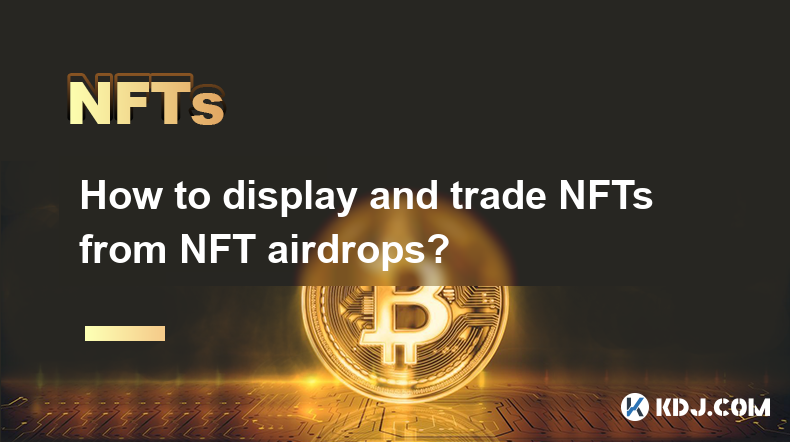
How to display and trade NFTs from NFT airdrops?
Apr 18,2025 at 04:42am
How to Display and Trade NFTs from NFT Airdrops? NFT airdrops have become a popular way for projects to distribute their tokens and engage with their community. If you've received NFTs through an airdrop, you might be wondering how to display and trade them. This article will guide you through the process step-by-step, ensuring you can showcase your NFT...
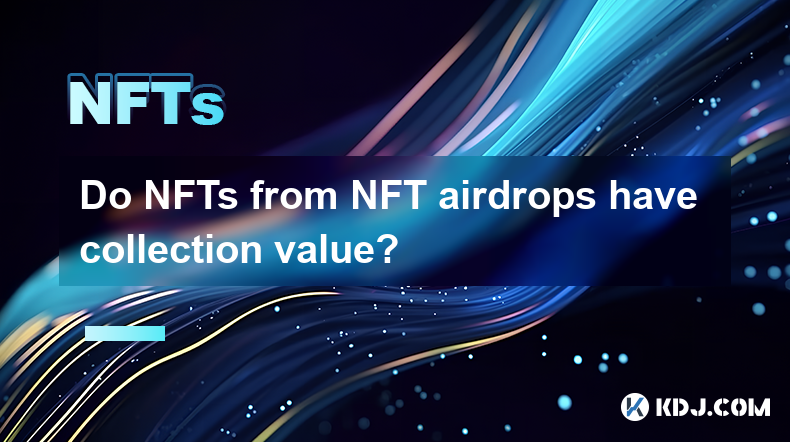
Do NFTs from NFT airdrops have collection value?
Apr 18,2025 at 11:49pm
NFTs, or non-fungible tokens, have become a significant part of the cryptocurrency ecosystem, and NFT airdrops are one way for projects to distribute these digital assets to their community. A common question that arises is whether NFTs received from airdrops have any collection value. To answer this question, we need to delve into various aspects of NF...
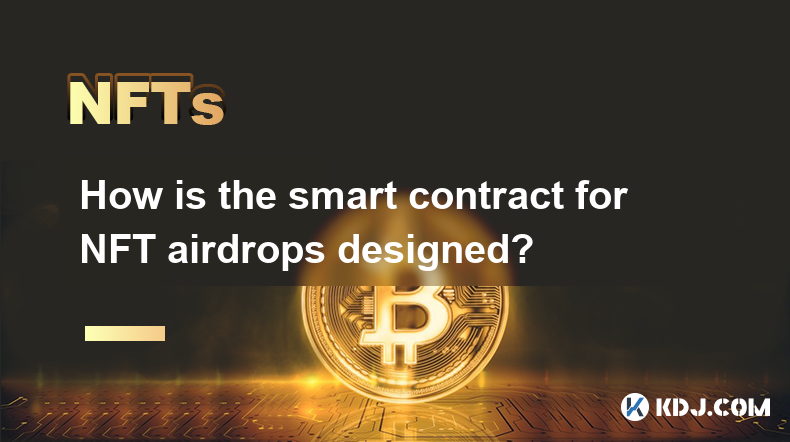
How is the smart contract for NFT airdrops designed?
Apr 18,2025 at 03:10am
The design of a smart contract for NFT airdrops is a complex process that requires careful consideration of various factors to ensure the airdrop is executed smoothly and securely. This article will delve into the intricacies of how such a smart contract is designed, focusing on key components, security measures, and the implementation process. Key Comp...
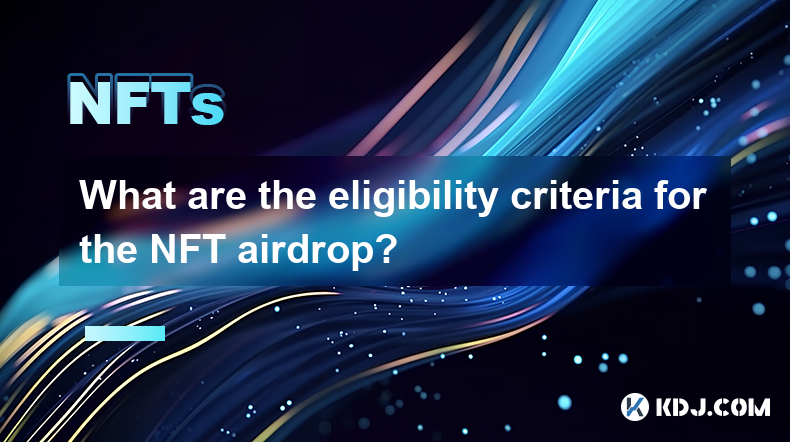
What are the eligibility criteria for the NFT airdrop?
Apr 17,2025 at 04:56pm
Understanding NFT AirdropsNFT airdrops are a popular method used by blockchain projects to distribute non-fungible tokens (NFTs) to their community members. These airdrops can serve various purposes, such as rewarding loyal users, promoting new projects, or increasing the visibility of existing ones. To participate in an NFT airdrop, individuals must me...

How to design a user authentication system for an NFT platform?
Apr 20,2025 at 01:49pm
Designing a user authentication system for an NFT (Non-Fungible Token) platform is crucial for ensuring security, user experience, and compliance with regulatory standards. This article will guide you through the process of creating a robust authentication system tailored for an NFT platform, covering key aspects such as user registration, login mechani...

How to protect the copyright of artworks on NFT platforms?
Apr 19,2025 at 06:28am
The rise of Non-Fungible Tokens (NFTs) has revolutionized the way digital art is created, bought, and sold. As artists increasingly turn to NFT platforms to showcase and monetize their work, protecting the copyright of these artworks becomes a crucial concern. This article explores various strategies and tools that artists can use to safeguard their int...

How to display and trade NFTs from NFT airdrops?
Apr 18,2025 at 04:42am
How to Display and Trade NFTs from NFT Airdrops? NFT airdrops have become a popular way for projects to distribute their tokens and engage with their community. If you've received NFTs through an airdrop, you might be wondering how to display and trade them. This article will guide you through the process step-by-step, ensuring you can showcase your NFT...

Do NFTs from NFT airdrops have collection value?
Apr 18,2025 at 11:49pm
NFTs, or non-fungible tokens, have become a significant part of the cryptocurrency ecosystem, and NFT airdrops are one way for projects to distribute these digital assets to their community. A common question that arises is whether NFTs received from airdrops have any collection value. To answer this question, we need to delve into various aspects of NF...

How is the smart contract for NFT airdrops designed?
Apr 18,2025 at 03:10am
The design of a smart contract for NFT airdrops is a complex process that requires careful consideration of various factors to ensure the airdrop is executed smoothly and securely. This article will delve into the intricacies of how such a smart contract is designed, focusing on key components, security measures, and the implementation process. Key Comp...

What are the eligibility criteria for the NFT airdrop?
Apr 17,2025 at 04:56pm
Understanding NFT AirdropsNFT airdrops are a popular method used by blockchain projects to distribute non-fungible tokens (NFTs) to their community members. These airdrops can serve various purposes, such as rewarding loyal users, promoting new projects, or increasing the visibility of existing ones. To participate in an NFT airdrop, individuals must me...

How to design a user authentication system for an NFT platform?
Apr 20,2025 at 01:49pm
Designing a user authentication system for an NFT (Non-Fungible Token) platform is crucial for ensuring security, user experience, and compliance with regulatory standards. This article will guide you through the process of creating a robust authentication system tailored for an NFT platform, covering key aspects such as user registration, login mechani...

How to protect the copyright of artworks on NFT platforms?
Apr 19,2025 at 06:28am
The rise of Non-Fungible Tokens (NFTs) has revolutionized the way digital art is created, bought, and sold. As artists increasingly turn to NFT platforms to showcase and monetize their work, protecting the copyright of these artworks becomes a crucial concern. This article explores various strategies and tools that artists can use to safeguard their int...
See all articles























































































